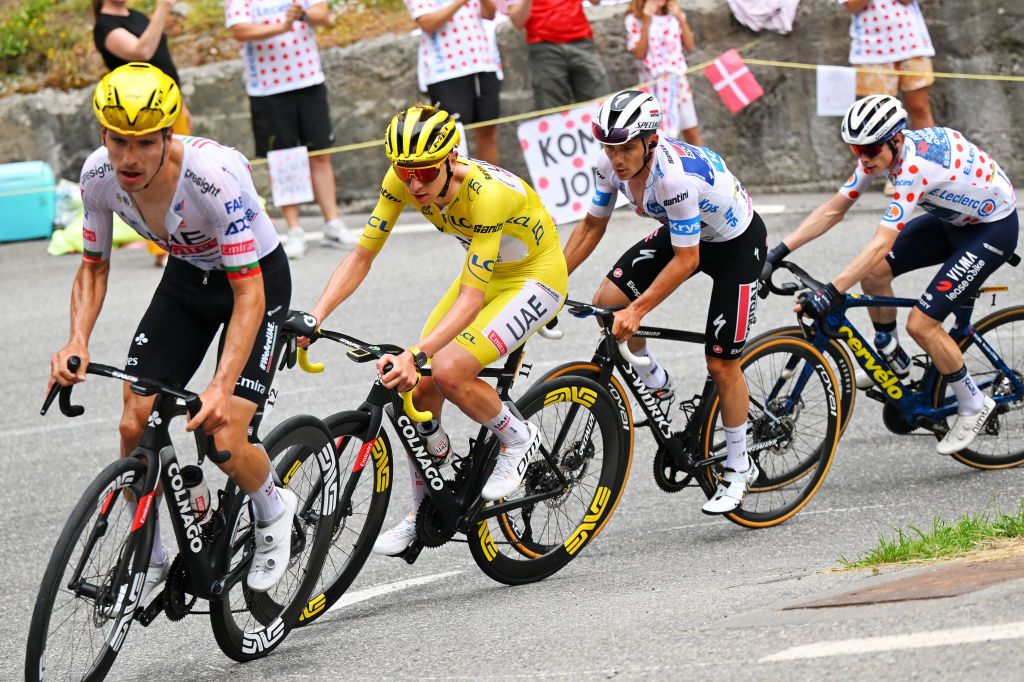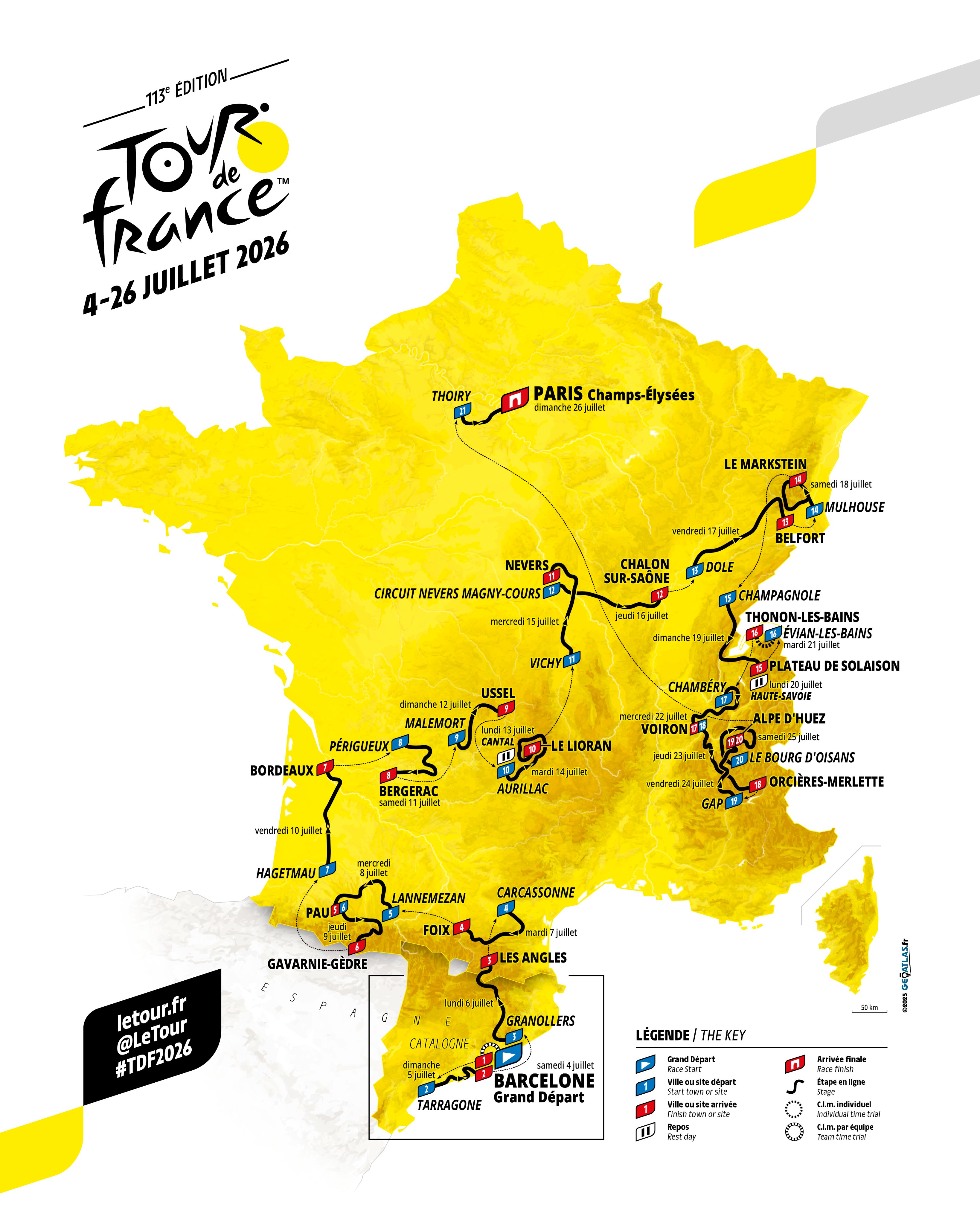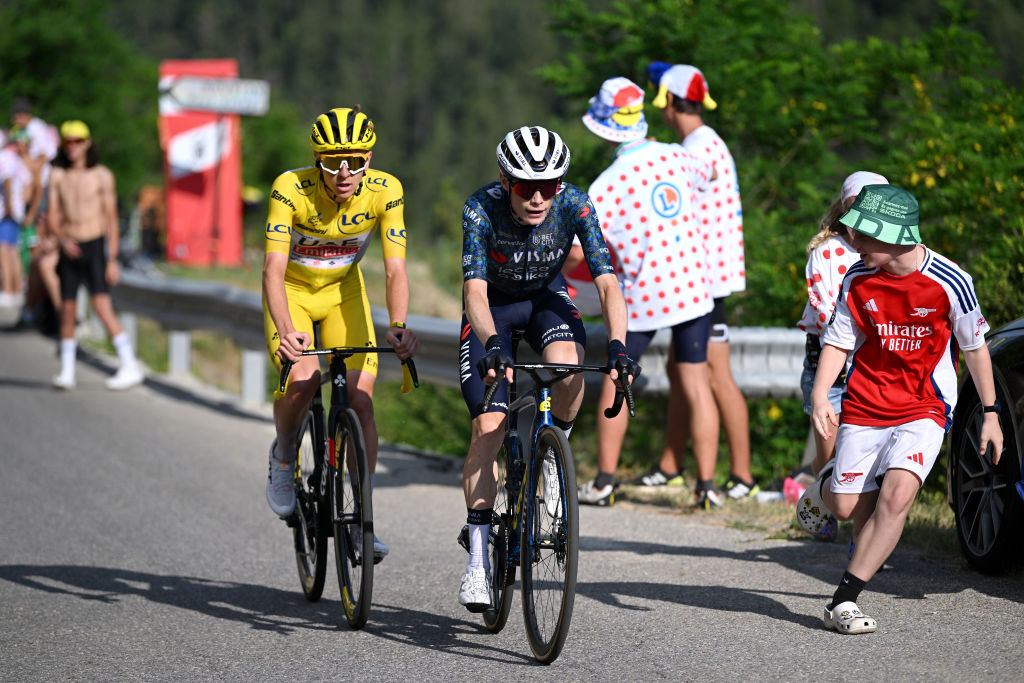
The route of the Tour de France 2026 was revealed in Paris today with an opening team time trial in Barcelona, the race's 27th foreign Grand Depart. It reaches the Pyrenees as early as stage three and later in the race the riders face two finishes at the top of the iconic Alp d'Huez in two days.
The final stage in Paris will once again visit the cobbled climb of le Montmarte, as it did this year when Wout van Aert became the first rider at the race to drop Tadej Pogačar on his way to a stage win.
The race will run through five mountain ranges - the Pyrenees, Massif Central, the Vosges, Jura and in the final days, the Alps. The highest point of the race will be the summit of the Col de Galibier (2,642m) on stage 20 to Alp d'Huez. That will be their second visit to the famous ski resort and they will approach it from the rear of the Col de Sarenne. The day before they will climb from Bourg d'Oisains up the famous 21 hairpins. The last rider to win there was Tom Pidcock.
Several mountains will make their debut in the race, including the Montée de Gavarnie-Gèdre, Col de la Griffoul, Col du Page, Col du Haag, Plateau de Solaison and the Col de Sarenne.
The three-week event is the second in the trio of Grand Tours, coming after the Giro d'Italia and before the Vuelta a España.
We'll be updating this page soon......
Tour de France 2026: Key details
Date |
4 July 2026 - 26 July 2025 |
Total distance |
3,333km |
Number of stages |
21 |
Start location |
Barcelona, Spain |
Finish location |
Paris, France |
UCI ranking |
WorldTour |
Edition |
113th |
Total climbing / elevation gain |
54,540m |
Leader's jersey colour |
Yellow (Maillot Jaune) |
Last year's winner |
Tadej Pogačar (Slovenia) |
Tour de France 2026: The route

Tour de France 2026 route: Stage list
Stage |
Date |
Start |
Finish |
Distance |
Terrain |
|---|---|---|---|---|---|
Stage 1 |
4 July |
Barcelona |
Barcelona |
19km |
TTT |
Stage 2 |
5 July |
Tarragone |
Barcelona |
182km |
Hilly |
Stage 3 |
6 July |
Granollers |
Les Angles |
196km |
Mountains |
Stage 4 |
7 July |
Carcassonne |
Foix |
182km |
Mountains |
Stage 5 |
8 July |
Lannemezan |
Pau |
158km |
Flat |
Stage 6 |
9 July |
Pau |
Gavarnie-Gèdre |
186km |
Mountains |
Stage 7 |
10 July |
Hagetmau |
Bordeaux |
175km |
Flat |
Stage 8 |
11 July |
Périgueux |
Bergerac |
182km |
Flat |
Stage 9 |
12 July |
Malemort |
Ussel |
185km |
Hilly |
Rest day |
|||||
Stage 10 |
14 July |
Aurillac |
Le lioran |
167km |
Mountain |
Stage 11 |
15 July |
Vichy |
Nevers |
161km |
Flat |
Stage 12 |
16 July |
Circuit Nevers Magny-Cours |
Chalon-sur-Saône |
181km |
Flat |
Stage 13 |
17 July |
Dole |
Belfort |
205km |
Hilly |
Stage 14 |
18 July |
Mulhouse |
Le Markstein Fellering |
155km |
Mountain |
Stage 15 |
19 July |
Champagnole |
Plateau de Solaison |
184km |
Mountain |
Rest day |
|||||
Stage 16 |
21 July |
Evian les Bians |
Thonon-les-Bains |
26km |
ITT |
Stage 17 |
22 July |
Chambery |
Voiron |
175km |
Flat |
Stage 18 |
23 July |
Voiron |
Orcières-Merlettee |
185km |
Mountain |
Stage 19 |
24 July |
Gap |
Alpe d'Huez |
128km |
Mountain |
Stage 20 |
25 July |
Le Bourg d'oisains |
Alpe d'Huez |
171km |
Mountain |
Stage 21 |
26 July |
Thiory |
Paris Champs-Élysées |
130km |
Flat |
Tour de France: The jerseys
The Tour de France jerseys and classifications are yellow for the overall leader, green for the leader in the points standings, polka-dot for the mountain classification, and white for the best young rider.
Along with the jersey prizes, there is an award for the most combative rider of each stage, with the winner wearing a red number on the following day. This is awarded each day, with a 'Super Combativity' award decided by a jury at the end of the race for the most active rider throughout the entire event.
There is also a team classification where the time of the first three riders from each team is put together to create a single time. This is then done in a similar way as the individual general classification.
In addition, there are bonus seconds up for grabs at the race. There are ten, six and four bonus seconds available at the end of each stage for the first three riders, as well as bonus sprints that are dotted throughout the race on key climbs to try and make the racing more entertaining for spectators.
Tour de France 2026: The teams
The Tour de France peloton consists of 23 teams of eight riders. One more team that previous years. This includes all 18 UCI WorldTour teams, as well as the two best-ranked UCI ProTeams, and three further squads that were invited by the organiser, ASO.
Tour de France 2026: General classification riders

When it comes to potential yellow jersey winners, there is already a standout favourite. Tadej Pogačar. Undoubtedly the greatest rider of his generation, probably the greatest rider of all time, the Slovenian is going for his fifth overall win, a feat that would put him on level terms with Jacques Anquetil, Eddy Merckx, Bernard Hinault and Miguel Indurain.
The Slovenian has already committed to the Tour next year, saying he will not ride either the Giro d'Italia or the Vuelta a España
2022 and 2023 champion and last year's runner-up Jonas Vingegaard will likely be his biggest rival while we still wait to hear from other GC riders what they will target in 2026.
Tour de France: previous winners
- 2025: Tadej Pogačar (Slo)
- 2024: Tadej Pogačar (Slo)
- 2023: Jonas Vingegaard (Den)
- 2022: Jonas Vingegaard (Den)
- 2021: Tadej Pogačar (Slo)
- 2020: Tadej Pogačar (Slo)
- 2019: Egan Bernal (Col)
- 2018: Geraint Thomas (GBr)
- 2017: Chris Froome (GBr)
- 2016: Chris Froome (GBr)
- 2015: Chris Froome (GBr)
- 2014: Vincenzo Nibali (Ita)
- 2013: Chris Froome (GBr)
- 2012: Bradley Wiggins (GBr)
- 2011: Cadel Evans (Aus)
- 2010: Alberto Contador (Esp)
Tour de France FAQ
How does the Tour de France work?
The Tour de France takes place over 21 stages, with the winner - the man who claims the yellow jersey - being the rider with the lowest cumulative time over the three weeks. Each stage has its own individual winner, but the person who wins overall might not win a single one of these.
It is one of the three Grand Tours, along with the Giro d'Italia and the Vuelta a España, and is the most famous and prestigious.
What makes up the Tour de France?
The race takes on varying terrain with flat days for sprinters, hilly days for puncheurs and mountains for the climbers and GC riders, along with time trials, so that a winner of the race has to be able to perform on all types of road.
What's the general classification?
The Tour, like all Grand Tours, The main prize in the race, known as the general classification, is based on time with the overall leader wearing the yellow jersey. The race leader and eventual winner is the rider who has the lowest accumulated time over the 21 days of racing. Riders can win the Tour de France without winning a stage, as Chris Froome did in 2017. Time bonuses of 10, six, and four seconds are given to stage winners though, creating incentive for those general classification riders to chase individual victories and lower their overall time.
In 2024 it took race winner Tadej Pogačar 83 hours, 38 minutes, 56 seconds to complete the race with the second-placed rider, Jonas Vingegaard, overall 6:17 slower. That continues all the way down to the last place rider, which was Mark Cavendish, who finished 6 hours, 23 minutes, 11 seconds behind.
Read our full general classification guide.
What are the other competitions?
The white best young rider's jersey is worked out in the same way but only riders under the age of 26 on 1 January are eligible for the jersey. This means anyone born in 2000 or after.
The polka-dot mountains jersey and the green points jersey are based on a points system and not time, gained throughout the race on climbs and at sprint points respectively.
The team classification is based on the general classification times of the first three riders of a team on each stage. The time of those three riders is added up and put onto their team's time, creating a GC list much like in the individual classifications. The leading team gets to wear yellow numbers and helmets on each stage.
The final classification available is the combativity prize. This is decided by a race jury or, in more recent years, social media. This takes place just before the end of each stage and often goes to a rider from the breakaway who has put in a daring performance or attempted to liven up the stage by attacking. The winner of the combativity award gets to wear a special red race number on the following day's stage.
There is a final prize added to this with the Super Combativity prize being awarded on the podium in Paris. This is decided in a similar fashion to pick out the most aggressive, entertaining, and daring rider of the whole three weeks. Again, usually going to a rider who has featured regularly in the breakaway.
Who rides the Tour de France
All 18 UCI WorldTour teams automatically qualify for the Tour de France, another five spots are given to 'wild card' teams, chose by organisers ASO. These places typically go to smaller French teams along with the best performing ProTeams - the category below WorldTour. Each team then picks it's eight man squad depending on the riders ability, form and the team's target for the race.
How long is the Tour de France?
The Tour de France takes place over 23 days with 21 of them being race days. The riders get two rest days that usually fall on the second and third Monday of the race.
How long is a stage?
Road stages can range from anything around 100km to something approaching 250km, sometimes more.
Road stages often take around four to five hours with the longer days sometimes nudging over seven hours.
Time trials are always much shorter. Team time trials have long since gone out of fashion in the world of road racing so individual time trials are the main focus these days.
When does the Tour de France start?
The 2026 Tour de France starts on 4 July in Barcelona, Spain, with a road stage and finishes in Paris three weeks later, with the traditional procession for the general classification riders and full-blooded sprint for the fast men on the iconic Champs-Élysées.
The 2026 edition of the race runs from 4-26 July, covering 21 stages.
Why isn't it starting in France
Foreign Grand Departs - the first three days of the race - are becoming more and more common for the three Grand Tours. Hosting three days of racing, and the build up, costs several million euros and it is becoming harder and harder for smaller cities to be able to afford it.
Taking the race to other countries also helps ASO introduce the race to new fans, and virtually guarantees massive crowds. The 2027 Tour will start in the UK. The 2026 Giro d'Italia is starting in Bulgaria
Tour de France 2026: On TV
As per this year, the race should be live-streamed on Discovery+ and TNT Sports in the UK. Subscription currently costs £6.99/month or $8.99/month, and £39.99 or $49.99 for a year. The race is also streamed, for the final time, on ITV4 in the UK, and is free to view.
A Flobikes annual subscription will cost you $209.99 if you want to watch in Canada, while in the USA NBC Sports via Peacock Premium ($4.99 per month) will show the race. Australians can can watch the Tour for free on SBS on Demand.
And, of course, if you want to watch your local stream from anywhere in the world you'll need a VPN from a trusted company like NordVPN.







